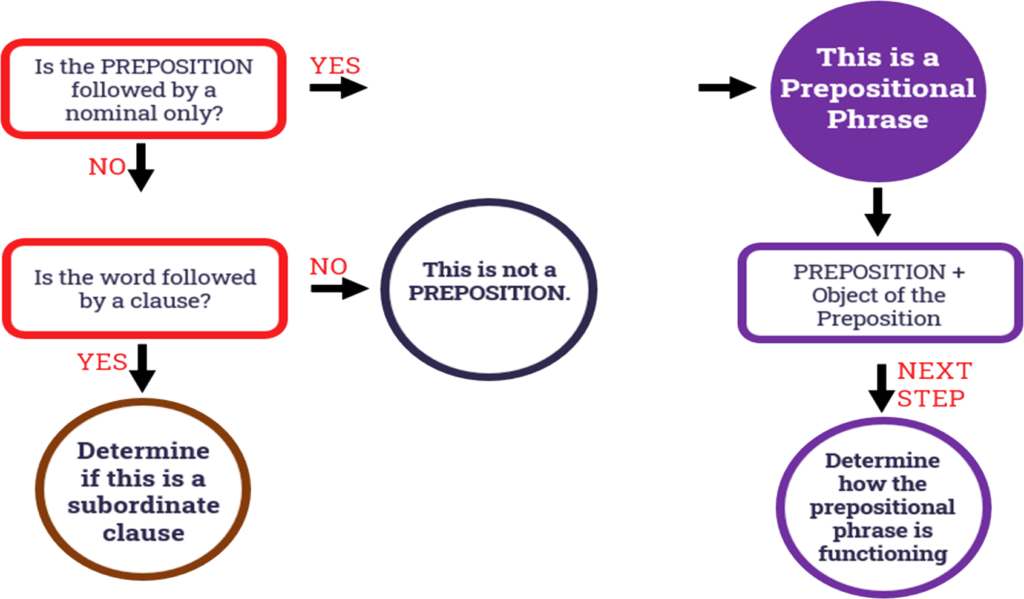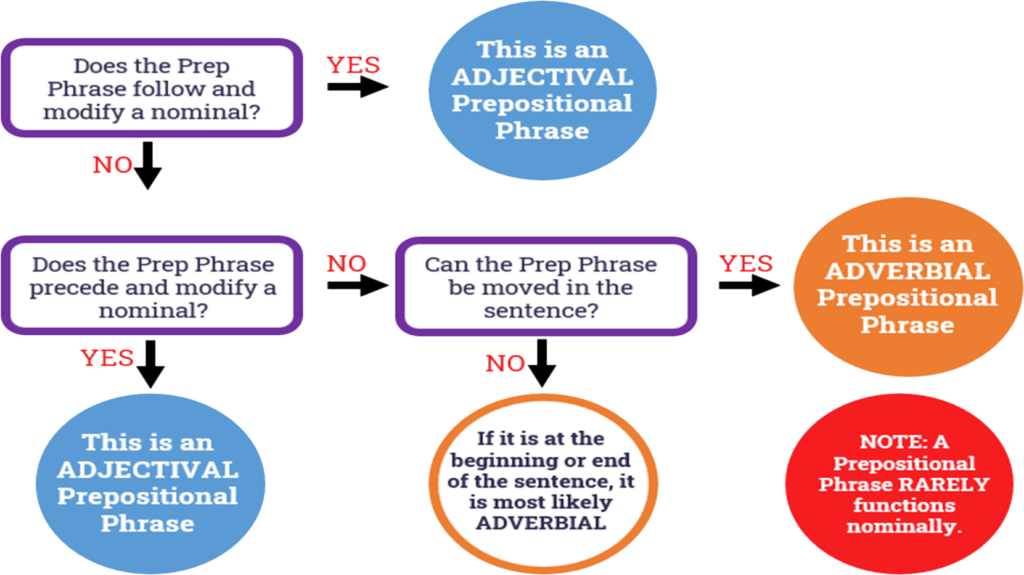Chapter 04-02: Phrases III – Prepositional Phrases
chapter 4: prepositional phrases
Prepositions are structure-class words that, in a prepositional phrase, precede a nominal, which is the object of the preposition. Together, the preposition and its object form a unit that can modify words, phrases, clauses, or whole sentences. To repeat from an earlier discussion, simple prepositions consist of one word. Common simple prepositions include
- about
- across
- after
- against
- among
- around
- as
- at
- before
- beside
- between
- by
- concerning
- during
- for
- from
- in
- into
- including
- like
- near
- on
- of
- opposite
- out
- over
- pending
- regarding
- since
- to
- through
- under
- until
- via
- with
- without
Many of these words can also do double duty as subordinators, so be sure you can tell the difference.
Phrasal prepositions consist of two or more words. Common phrasal prepositions include
- according to
- apart from
- because of
- by virtue of
- down from
- except for
- instead of
- off of
- outside of
- regardless of
- short of
- together with
- up to
Prepositions occur before a nominal (in the “pre-position”): under the blanketover the toptogether with the green shirt
Most commonly, prepositional phrases function adjectivally or adverbially, but only rarely do they function nominally. You can use the following flow charts to help guide your analysis:


Prepositional phrases can modify words, phrases, clauses, or whole sentences:
We hurried to the store.Preposition to + nominal the store = prepositional phrase. It is functioning adverbially to modify HURRIED. The book with the green cover looks interesting.Preposition with + nominal the green cover = prepositional phrase. It is functioning adjectivally to modify BOOK. Here are some other examples from Tarzan of the Apes: The fact is that in the telling of it to you I have taken fictitious names for the principal characters.
- Preposition in + gerund phrase the telling = prepositional phrase. It is functioning adverbially to modify the sentence.
- Preposition of + nominal it = prepositional phrase. It is functioning adjectivally to modify the gerund TELLING.
- Preposition to + nominal you = prepositional phrase. It is functioning adverbially to modify the prepositional phrases IN THE TELLING OF IT.
- Preposition for + nominal the principal characters = prepositional phrase. It is functioning adjectivally to modify the noun NAMES.
While we normally analyze prepositional phrases individually, we can also see the first three prepositional phrases as a single adverbial because we can remove it or move it around and the sentence will still make sense:
- The fact is that . . . I have taken fictitious names for the principal characters
- in the telling of it to you . . . The fact is that I have taken fictitious names for the principal characters
So I give you the story as I painstakingly pieced it out from these several various agencies.
- Preposition from + nominal phrase these several various agencies = prepositional phrase. It is functioning adverbially to modify the subordinate clause.
We can test this analysis by removing it or moving it around:
- So I give you the story as I painstakingly pieced it . . .
- So I give you the story . . . from these several various agencies . . . as I painstakingly pieced it out.
Also, while AS is oftentimes a preposition, in this case it is a subordinator, preceding a clause and marking it as a subordinate clause From the records, we learn that a certain young English nobleman was commissioned to make an inquiry.
- Preposition from + nominal phrase the records = prepositional phrase. It is functioning adverbially to modify the whole sentence.
Introductory phrases, prepositional phrases or non-finite verb phrases, are most often adverbial. That placement in a sentence is a KEY MARKER. Finally, you should be able to distinguish between the preposition TO and the infinitive marker TO: Jane ran to first base.Jane tried to run towards first base. Don’t confuse an infinitive with a prepositional phrase beginning with to:Infinitives (TO + VERB in its base form):
- to laugh
- to smile
- to think
- to ponder
- to run
- etc.
Prepositional Phrases (TO + NOMINAL):
- to her
- to the student
- to my room
- to the mountains
- etc.
Because some words can by used as either nouns or verbs, you may encounter ambiguous constructions: Mom leaves estate to murder defendant. You should be able to analyze the above headline and describe all the ambiguities, especially the problem of to as an infinitive or to as a preposition.